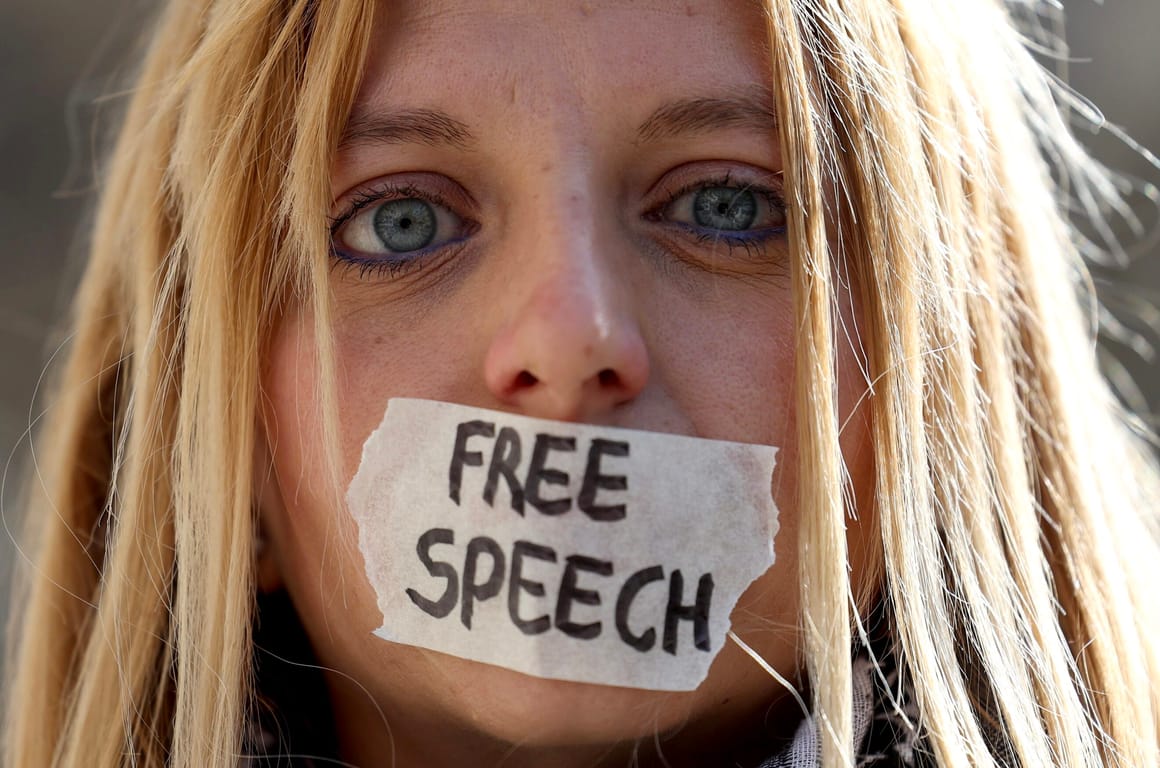Lifestyle
Britain Faces Growing Concerns Over Free Expression Erosion

The landscape of free expression in the United Kingdom is undergoing significant change, marked by a series of troubling incidents that have raised alarms about civil liberties. Recent events illustrate how the government’s approach to dissent is becoming increasingly restrictive, leading to fears about the future of public discourse.
Incidents of Suppression
In a striking example, Marianne Sorrell, an 80-year-old retired teacher, was arrested in Cardiff for quietly holding a placard during a peaceful pro-Palestine rally. Detained for nearly 27 hours, police conducted a search of her home, confiscating items including books and a walking stick. Such heavy-handed actions have sparked wider concerns about the treatment of individuals expressing dissenting views.
Another case involves Jon Farley, a 67-year-old former teacher in Leeds. At a vigil for Gaza, he held up a satirical cartoon from the publication “Private Eye,” which criticizes government rhetoric on terrorism. Farley was arrested under the Terrorism Act 2000, handcuffed, and interrogated for hours. “I was treated like a criminal for holding a satirical cartoon,” he stated, highlighting the chilling effect on free speech.
These incidents are not isolated. Earlier this year, Maxie Allen and Rosalind Levine, parents from Hertfordshire, were arrested after exchanging critical messages about their daughter’s school headteacher in a WhatsApp group. Six police officers arrived at their home, seizing their devices and interrogating them for hours over allegations of malicious communications. “We’ve gone from being concerned parents to criminal suspects — over a private conversation,” Allen remarked.
The Impact on Society and Culture
The climate of fear extends beyond public protests and private conversations. In the realm of comedy, Joe Lycett faced police scrutiny after an audience member reported him for an offensive joke. Although no charges were filed, the incident reflects a growing unease within the entertainment industry, where comedians are now self-censoring and journalists are consulting legal advice before publishing certain content.
Legislation also plays a significant role in this evolving landscape. The Police, Crime, Sentencing and Courts Act, passed in 2022, grants law enforcement expanded authority to disperse protests deemed “noisy” or “disruptive.” The act has been criticized for prioritizing volume over violence as a basis for arrest, effectively stifling public expression, particularly for marginalized voices.
Moreover, the newly introduced Online Safety Act empowers regulators to censor digital content categorized as “harmful,” a term that remains ambiguously defined. While intended to protect vulnerable users, the act poses risks to satire, parody, and legitimate political critique, leading to concerns about how far the state can extend its reach into personal expression.
The implications of these developments are profound. Critics argue that the government’s focus on maintaining public order is overshadowing the fundamental rights to free speech and dissent. As the U.K. grapples with these issues, it is critical to acknowledge that the erosion of civil liberties can occur gradually and often goes unnoticed until it affects a broader segment of the population.
This growing trend of suspicion and surveillance is reminiscent of past injustices that have primarily impacted marginalized communities. Historically, individuals of color in Britain have faced heightened scrutiny and repression, often without the same level of public outrage. Now, the majority-white population is beginning to experience similar challenges regarding free expression, highlighting the precarious nature of these rights.
As the U.K. continues to promote itself as a bastion of democracy and free speech, it is crucial to recognize that the country is at a crossroads. The spirit of open debate and irreverence that once defined British culture is fading, with public spaces like Speakers’ Corner in Hyde Park becoming increasingly silent.
The need for vigilance in protecting civil liberties has never been more pressing. The current trajectory suggests that without concerted effort to uphold the principles of free expression, the U.K. risks losing not only its reputation as a democratic society but also a fundamental aspect of its cultural identity.
-

 Top Stories3 months ago
Top Stories3 months agoTributes Surge for 9-Year-Old Leon Briody After Cancer Battle
-

 Entertainment4 months ago
Entertainment4 months agoAimee Osbourne Joins Family for Emotional Tribute to Ozzy
-

 Politics4 months ago
Politics4 months agoDanny Healy-Rae Considers Complaint After Altercation with Garda
-

 Top Stories4 months ago
Top Stories4 months agoIreland Enjoys Summer Heat as Hurricane Erin Approaches Atlantic
-

 World5 months ago
World5 months agoHawaii Commemorates 80 Years Since Hiroshima Bombing with Ceremony
-

 Top Stories3 months ago
Top Stories3 months agoNewcastle West Woman Patricia Foley Found Safe After Urgent Search
-

 Top Stories5 months ago
Top Stories5 months agoFianna Fáil TDs Urgently Consider Maire Geoghegan-Quinn for Presidency
-

 World5 months ago
World5 months agoCouple Convicted of Murdering Two-Year-Old Grandson in Wales
-

 World5 months ago
World5 months agoGaza Aid Distribution Tragedy: 20 Killed Amid Ongoing Violence
-

 World5 months ago
World5 months agoAristocrat Constance Marten and Partner Convicted of Infant Murder
-

 Top Stories4 months ago
Top Stories4 months agoClimbing Errigal: A Must-Do Summer Adventure in Donegal
-

 Top Stories4 months ago
Top Stories4 months agoHike Donegal’s Errigal Mountain NOW for Unforgettable Summer Views








